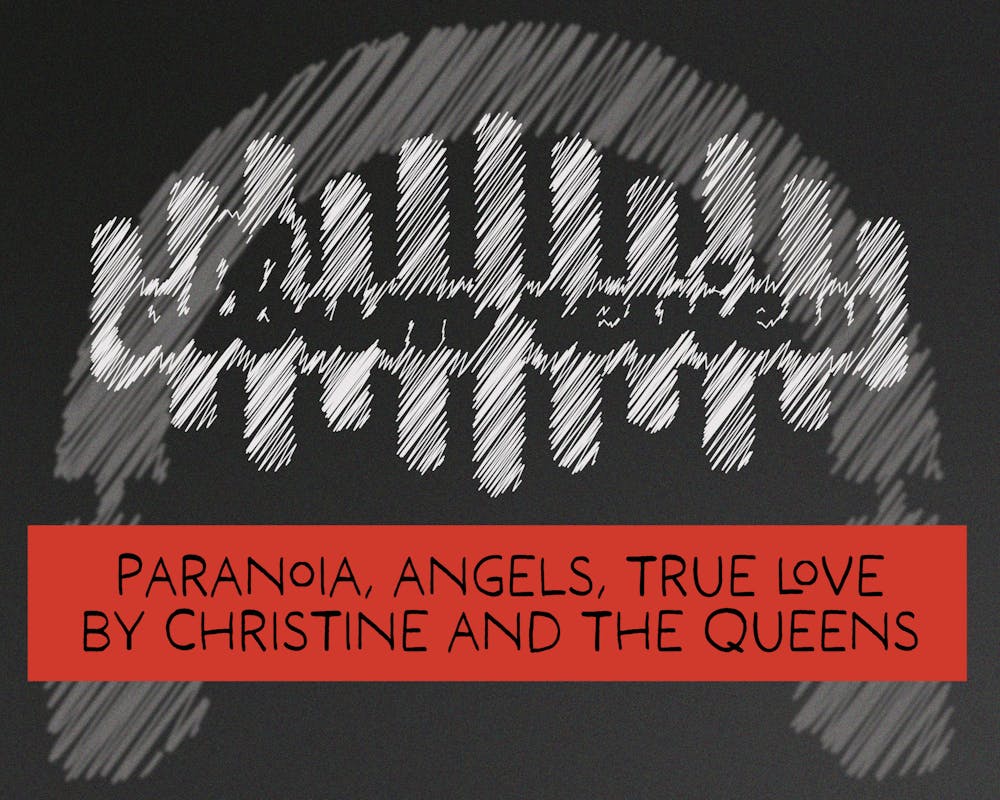Angels. Love. Self-discovery. Rebirth. These are just some of the recurring motifs within Christine and the Queens’ fourth album, “Paranoïa, Angels, True Love,” a stunning comeback for the French singer after recovering from the loss of his mother. Unlike its predecessors, this album challenges the singer, allowing him to move past 1980s influences into a new realm of experimentation.
In the last five years, Christine and the Queens, otherwise known as Héloïse Letissier, has undertaken a lot in his career. 2018 saw the rise of his second album, “Chris,” and just a year later, his mother died. Next, the COVID-19 pandemic hit, sending all artists into lockdown, unable to create with as much ease as before. Yet, these highs and lows led the singer to fall in love with the sentiments of Tony Kushner’s play, “Angels in America.”
Letissier’s obsession with this iconic piece of art became the foundation of his new album, finding solace in Kushner’s views of queerness, gender roles, religion and cultural and societal stigmas against minorities. Much like its title suggests, Christine and the Queens thus walks listeners through three stages during the album: fear in one’s identity, a spiritual awakening and finding love and comfortability in one’s self and others.
Co-produced by Mike Dean, who has worked with artists such as Beyoncé and Travis Scott, the album’s high points begin right at the start. Much like a play, the first track “Overture” sees the singer use spoken word and rock instrumentation to invite listeners into its 20 tracks. He says, “Welcome to the tale of your own light, my child,” using the light as a symbol of rebirth.
Following this opening comes tracks such as “Tears can be so soft” and “A day in the water,” the first seeing the singer admit to his loneliness, referring to his mother’s death and potentially the side effects of the pandemic. Meanwhile, the latter is a new sound from the singer, reminiscent of his earlier work, “Chaleur Humaine.” In a song full of questions, Letissier wonders what it would feel like to live in peace, finding a lot of stress and internal conflict with his queerness as he says, “Let me be.’
Additionally, Christine and the Queens utilizes other artists to help get his vision across, especially as he moves into the second stage of the album. Acting as a higher power, Madonna speaks to the singer on tracks “Angels crying in my bed,” “I met an angel” and “Lick the light out,” guiding him through his pain and loss. Likewise, Dean comes in handy again in this stage, using synths and layering to make Letissier’s voice the focal point of songs “He’s been shining forever, your son” and “Flowery days.”
Letissier doesn’t lose momentum once throughout the album’s progression, collaborating once more with 070 Shake to create beautiful reflections of finding love and happiness, and most importantly connection with one’s body and mind, on “True love” and “Let me touch you once.” Experiencing these moments of clarity and light, as the singer refers to before, these songs are ones that integrate R&B and pop influences and expand his musical catalog.
The last six tracks of “Paranoïa, Angels, True Love” are simple but allow for the album to come to a complete close. “Shine” is a track where the singer is determined to find happiness, even when it seems impossible, singing, “No more of those sweet lies / Looking for shine / In all the land.” “We have to be friends” is the first major pop song we get on the album, and the singer fights the urge not to give into temptation.
However, the biggest moment on this album is “To be honest,” which could easily bring one to tears with how emotional its lyrics and composition are. Letissier embraces his flaws on this track, pointing out how they shaped him and his behavior. He says, “I get lost in my thoughts / And for hours of time / And it’s making me feel / Like I am not alone anymore,” a common occurrence that many overthinkers can relate to.
“Big eye” is the final stop on this album, and it seems like the singer has reached the point he’s always wanted to since the start of his career: acceptance of who he is. After much speculation about his gender identity in the media, this track serves as Letissier’s response to it with mantras such as “My love is my light,” “My love is my soul” and “My love is my power,” making it a powerful end.
Overall, “Paranoïa, Angels, True Love” is an amazing feat by Christine and the Queens, a work that goes beyond just an album, working as both a musical background to Letissier’s emotional journey and a blueprint of how to merge theater with music.
Rating: 5 / 5






